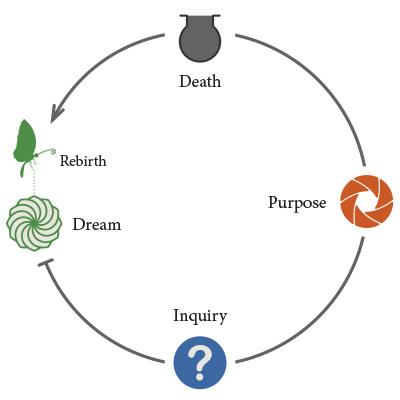
- Activities

Process Design is a approach to designing "long now" and "big here" processes that enable the conscious and continuous collaborative shaping of a community's (or organization's) culture. My work specifically looks at processes that create participatory and regenerative cultures; that is, cultures that recognize the importance of cooperation between its individuals and with the other-than-human world.
I lend the use of the word “process” from Process Philosophy, which views the nature of being as dynamic, continuously changing; that reality is in a continuous state of becoming. In order for us to work with this dynamic nature, we need to consider how our processes of living and working might change and be adapted continuously to the changing social, cultural, political, technological, and ecological context in which a community (or humanity as a whole) is a part of - while respecting and building on the legacy of the past.
The above terms, coined by Brian Eno, are adopted as two beautiful and simple terms that define disposition of the process design approach.
Long Now, as Eno defines it, is "the recognition that the precise moment you're in grows out of the past and is a seed for the future." Through viewing our thoughts, plans, and actions from this perspective, we are able to take on more responsibility of our participation with the world. This view is held by many indigenous communities, in how they transfer knowledge and care for their environment in order to provide for themselves now, in respect to their ancestry and for the generations to come. Stewart Brand, author of the Clock of the Long Now book, asks a crucial question for Modern Humans: "How do we make long-term thinking automatic and common instead of difficult and rare? How do we make the taking of long-term responsibility inevitable?"

Big Here is a the view of a specific place (land, town, city) and it's relationship with the wider ecosystem it lives in (bioregion, Earth). In thinking from a "big here" perspective, we start to see how the Earth is an interconnected whole-system made of part-systems. Whenever a part changes, it inevitably affects the whole. In the community development field, this perspective is sometimes called "cosmopolitan localism." This is modernity's strength, our science has enabled us to perceive the workings of the Earth systems and their relationships, enhanced by our ability to connect to each other from most places in the world, creating the potential for humanity to act in participation with each other.

Culture is a complex collective representation of a community's view on life. It emerges from the relationship between its individuals. If our reality is continuously changing, then our cultural forms need to work in respect to this dynamism. We may view culture as having a natural life-cycle (as illustrated above): from a current state, we dream of new ways of living and working in the world, then ask questions about how can this dream be achieved, to then act for the purpose of manifesting this dream, which eventually dies to enable new dreams to emerge.
Culture naturally changes over time, in relationship with the environments we live in. Yet, in our current times, our world is in rapid change; propelled by political and social instability, fast technological advancement, economic vulnerability, climate change, and mass ecological extinction, we are finding ourselves needing to change faster than we are used to. In this stumbling, we may find that this change cannot occur coherently without approaching it consciously, through design.
Process Design seeks to bring the "long now" and "big here" perspectives together, in order to work attentively with our rapidly changing world. As with the process of life, this approach designs questions and processes as a form of working with issues, that they themselves have a changing nature. Rather than holding a dogmatic/utopian potential future, this approach investigates on how we can continuously work and reflect with the current moment, while finding inspiration from the wisdom of the past, and deeply considering its ramifications on the future.